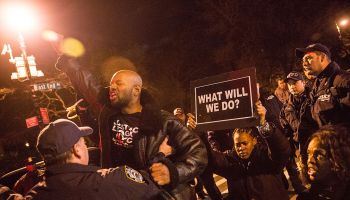NORFOLK, Virginia — Eleven suspected Somali pirates accused in separate attacks on two U.S. Navy ships off the coast of Africa were indicted in federal court on Friday.
There was heavy security at the courthouse in Virginia when the men appeared wearing handcuffs and either bright orange or olive drab prison outfits. One used crutches and had a bandage wrapped around his head. Another used a wheelchair, with his leg covered in bandages because it had been amputated below the knee.
RELATED: U.S. Navy Ship Captures Pirates Near East Africa
The government said the injuries were the result of the men’s alleged battle with the Navy.
Text continues after gallery …
The defendants did not enter pleas. An interpreter read them the charges of piracy, attacks to plunder a vessel, assault with a dangerous weapon, and use of a firearm during a crime of violence. Piracy carries a mandatory life sentence; the other charges carry penalties of 10 to 35 years.
The men, appearing weary and impassive, sat in the jury box during the 90-minute hearing. They did not make any statements other than to say they understood the court proceeding.
U.S. Magistrate Tommy Miller scheduled a detention hearing Wednesday and ordered the men kept in custody until then. They have no listed assets, so they will be assigned defense attorneys.
Five of the men were captured March 31, after the frigate USS Nicholas exchanged fire with a suspected pirate vessel west of the Seychelles.
RELATED: Somali Pirates Fire On U.S. Navy Helicopter
The other six were captured after they allegedly began shooting at the amphibious dock landing ship USS Ashland on April 10 about 380 miles (610 kilometers) off Djibouti, a small nation facing Yemen across the mouth of the Red Sea.
U.S. Attorney Neil H. MacBride said the Defense Department has pushed for the U.S. prosecution because the Navy was the victim and believed the piracy charges could be proved in federal court.
“Piracy threatens human lives and disrupts international commerce,” MacBride said. “When pirates attack U.S. vessels by force, they must face severe consequences.”
The trial, which could be scheduled within two months, would be held in a court that has a strong reputation for maritime law. Naval Station Norfolk, the world’s largest naval base, is within 10 miles (16 kilometers) of the courtroom. Both ships in the attacks are part of the Atlantic Fleet based in the Hampton Roads, Virginia, area.
The 11 had been held on U.S. ships for weeks off Somalia’s pirate-infested coast as officials worked to determine whether and where they could be prosecuted and prepare legal charges against them.
The transfer of the case to a U.S. court comes amid discussions about setting up an international court to prosecute piracy suspects. Some nations have been reluctant to do that because of difficulties transporting suspects, fears they may claim asylum and thorny jurisdiction issues.
The Somali mission to the United Nations said it is attempting to sort out the latter.
“We prefer those kids to be tried in Somalia,” said Omar Jamal, first secretary for the mission. “The Somali government is against piracy and its practice, and asks the international community’s support to stop it.”
U.S. warships are part of an international flotilla protecting shipping in the region.
Kenya, south of Somalia, has taken some to its courts but now says pirates are putting too much strain on the country’s court system. Some pirates have been released after capture because no nation could be found to try them.
















